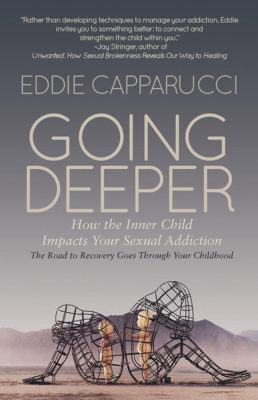 By Eddie Capparucci, PhD, LPC, C-CSAS
By Eddie Capparucci, PhD, LPC, C-CSAS
Before you begin reading this article, I would like to point out that those who have been betrayed are not to be blamed in any way for the intensity of the anger and frustration they express. Their actions are the result of trauma and should be seen as emotional and mental distress instead of hostility. The objective of this article is to educate betrayers about how their desire to explain their actions does nothing to help their betrayed partner heal – but instead intensifies the situation. Also note, men too can be betrayed by those they love.
I have said numerous times that more betrayers die on the hill trying to help their partner heal than on the road to recovery. Clinicians who work in this field understand that this defensiveness is a troubling issue with some betrayers as they try to justify or, in some cases, minimize their inability to adhere to boundaries. And it seems that no matter how much counselors and coaches work with these clients, the struggle remains.
So, how do we successfully communicate that no matter how successful betrayers may be in their recovery efforts, if they do not learn to effectively help their partners heal, the relationship will suffer and, in some cases, die? I find that the best way to do this is to inform them about the perils of “explaining.”
Providing explanations is required when we want to help people understand directions and objectives. However, attempting to explain inconsiderate actions to a betrayed partner who is experiencing a grieving period is like throwing kerosene onto a fire. Why? Because when someone is triggered and their trauma heightens, the limbic system in the brain becomes highly active.
The limbic system serves as our emotional warehouse. During heightened levels of distress, the limbic system takes over and betrayed partners do not have immediate access to the part of the brain that serves to provide rationale thought – the prefrontal cortex. This is not their fault. It is simply how the brain operates when trauma is present.
Meanwhile, during this time of crisis, the betrayer feels he is caught in a massive storm and tries everything to calm the tempest. And the tool he relies on most often is an explanation. He says things like, “I know I should have called when I left the office as I promised I would, but right as I was leaving the office, a client called, and the call lasted much longer than I thought it would.” But this does nothing to calm the storm.
As in most circumstances, there is no need for him to provide an explanation. He did not keep his commitment. He blew it! The only explanation that may have been acceptable is if he called from the hospital saying he broke his leg tripping over a curb on the way to his car because he was no paying attention as he was starting to dial his wife.
When You’re Explaining, You’re Not Listening
So, we have a scene in which the wife is understandably upset because a boundary has been broken and when her concern is expressed – perhaps in a loud fashion – the husband, in self-defense, pulls out his explanation. However, this approach is not going to work. The wife is triggered and has no interest in hearing explanations. She is focused on one thing – the pain of his broken commitment. Still, this guy might spend the next several hours trying to convince his wife the phone call was a priority. If so, he will continue to get trounced by the storm.
Attempting to provide rationale explanations when your betrayed partner is triggered is like trying to train a wild tiger – you’re going to get battered, or worse. Again, this is not the betrayed partner’s fault. She is enduring extreme emotional and mental anguish, and Perry Mason is trying to make his case for why she should not be upset.
But here’s the important point to all of this. When betrayers attempt to explain their misconduct, those betrayed are thinking, You’re not hearing me! And they are right. When we reach for our explanation tool, we have turned inward and the focus is on our own self-defense. We have left our vulnerable partners abandoned with their pain as we try to talk ourselves out of the latest crisis.
I can hear betrayers as they read this article saying, “Is there ever a time for explanation?” The answer is yes. When your betrayed partner is not triggered. During these times, your partner will be able to better handle your attempts to rationalize your actions. But you would be better off simply owning up to the fact that you blew it, and then designing a game plan so you will not break your commitment again.
Solution
Here are four ideas that can assist you in helping your betrayed partner heal while helping you stop with the explanations.
- First, recognize your spouse’s pain and stop focusing on any hostility that is aimed at you. This is difficult but can be accomplished if you slow everything down and stop worrying about being in trouble or feeling offended. Instead, take the focus off of yourself and try to identify her pain point. If you cannot identify the pain point, ask questions so you can obtain more insight. Also, seek help from a qualified professional who can assist you in becoming more attuned to your partner’s wants, needs, and emotions.
- Prepare for storms. These crises will keep coming until your partner reaches a point where she feels safe and secure again. Spend time each day thinking about how you will react when your partner is triggered and what steps you will take to be outwardly focused on her pain. You must learn to hold onto your own emotional discomfort and move forward to assist your partner in healing. Waiting for the storm to come before determining how to react will lead to your drowning – over and over again.
- Take steps to limit storms. You can do this by asking yourself a simple question before taking any action. “How will this action (or inaction) impact my partner?” This will allow you to slow down before making a potential misstep that may cause a triggering episode. Believe me, this strategy will be one of the best tools you have available if you utilize it.
- Finally, work on changing your attitude. You can no longer be focused on how exhausting the situation has become or how your ego is being battered. You created this mess, and it is up to you to deal with it, and the best way to do that is by utilizing an attitude that is guided by the Fruit of the Spirit.
But the fruit of the Spirit is love, joy, peace, forbearance, kindness, goodness, faithfulness, gentleness, and self-control. Against such things, there is no law.
Gal. 5:22-23
Notice nowhere in that Scripture does it refer to “explaining.”
**********
 Dr. Eddie Capparucci is a licensed professional counselor and works with men to help them manage their problematic sexual behaviors. He is the creator of the Inner Child Recovery Process™ for the Treatment of Problematic Sexual Behaviors and is the author of the book “Going Deeper: How the Inner Child Impacts Your Sexual Addiction.” Dr. Capparucci has appeared on numerous webcasts, podcasts, and radio and television programs over the years. Among his clients are pro athletes and television personalities. You can learn more about him and his Inner Child Recovery Process by visiting www.innerchild-sexaddiction.com.
Dr. Eddie Capparucci is a licensed professional counselor and works with men to help them manage their problematic sexual behaviors. He is the creator of the Inner Child Recovery Process™ for the Treatment of Problematic Sexual Behaviors and is the author of the book “Going Deeper: How the Inner Child Impacts Your Sexual Addiction.” Dr. Capparucci has appeared on numerous webcasts, podcasts, and radio and television programs over the years. Among his clients are pro athletes and television personalities. You can learn more about him and his Inner Child Recovery Process by visiting www.innerchild-sexaddiction.com.
